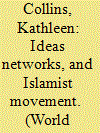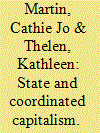| Srl | Item |
| 1 |
ID:
080922


|
|
|
| 2 |
ID:
080923


|
|
|
|
|
| Publication |
2008.
|
| Summary/Abstract |
Existing literature emphasizes the disorganizing or weakening effects of economic liberalization on civil society, whereby free-market policies are said to demobilize and depoliticize collective actors. the article evaluates the effects of economic liberalization on large-scale societal mobilizations across seventeen latin american countries for the period 1970-2000. the article further tests the effects of economic liberalization on individual political participation across sixteen latin american countries for the period 1980-2000. in contrast to the atomization literature, this article provides strong evidence that economic liberalization leads to greater levels of societal mobilization in the context of free-market democratization. the article also demonstrates that economic liberalization does not induce a decline in political participation. collectively, these results cast doubt on the theoretical underpinnings and empirical findings presented in Kurtz (2004).
|
|
|
|
|
|
|
|
|
|
|
|
|
|
|
|
| 3 |
ID:
080921


|
|
|
|
|
| Publication |
2007.
|
| Summary/Abstract |
By pressuring governments to hold democratic elections and by becoming directly involved in the electoral process through technical assistance and funding or as election monitors, international actors now play a visible role in domestic elections and other democratic processes throughout the developing world. although scholars have documented several macrolevel relationships between international-level variables and movement toward democracy, there has been little attention paid to the microlevel effects of international involvement in the democratization process. this article examines the effects of international election observation as a prominent form of international involvement in domestic elections and exploits a natural experiment in order to test whether international observers reduce election fraud. using data from the 2003 presidential elections in armenia, the article demonstrates that although observers may not eliminate election fraud, they can reduce election-day fraud at the polling stations they visit. the unusual advantage of experiment-like conditions for this study offers unique causal evidence that international actors can have direct, measurable effects on the level of election-day fraud and, by extension, on the democratization process
|
|
|
|
|
|
|
|
|
|
|
|
|
|
|
|
| 4 |
ID:
080920


|
|
|
|
|
| Publication |
2007.
|
| Summary/Abstract |
This article investigates the politics of change in coordinated market econo\mies, and explores why some countries (well known for their highly cooperative arrangements) manage to sustain coordination when adjusting to economic transformation, while others fail. the authors argue that the broad category of "coordinated market economies" subsumes different types of cooperative engagement: macrocorporatist forms of coordination are characterized by national-level institutions for fostering cooperation and feature a strong role for the state, while forms of coordination associated with enterprise cooperation more typically occur at the level of sector or regional institutions and are often privately controlled. although these diverse forms of coordination once appeared quite similar and functioned as structural equivalents, they now have radically different capacities for self-adjustment.
The role of the state is at the heart of the divergence among european coordinated countries. a large public sector affects the political dynamics behind collective outcomes, through its impact both on the state's construction of its own policy interests and on private actors' goals. although a large public sector has typically been written off as an inevitable drag on the economy, it can provide state actors with a crucial political tool for shoring up coordination in a postindustrial economy. the authors use the cases of denmark and germany to illustrate how uncontroversially coordinated market economies have evolved along two sharply divergent paths in the past two decades and to reflect on broader questions of stability and change in coordinated market economies. the two countries diverge most acutely with respect to the balance of power between state and society; indeed, the danish state-far from being a constraint on adjustment (a central truism in neoliberal thought)-plays the role of facilitator in economic adjustment, policy change, and continued coordination
|
|
|
|
|
|
|
|
|
|
|
|
|
|
|
|